A Comprehensive Guide to Dog Dental Care
Our dog’s dental health is a cornerstone of their overall well-being. However, it’s an aspect of pet care that is often overlooked or misunderstood by many dog owners.
In this comprehensive guide, we delve deep into the intricacies of maintaining a healthy mouth for your furry companion. We’ll explore the essentials of dog dental anatomy, unravel the mysteries of common dental diseases, and provide practical, easy-to-follow steps for daily dental care. From the importance of regular tooth brushing to the role of diet in oral health, this guide is designed to offer you a complete understanding of how to keep your dog’s teeth and gums in top condition.
At Hachi Dog Grooming, we’re not just about keeping your dog’s coat shiny and smooth; we’re committed to their overall health and happiness. So, let’s embark on this journey together and unlock the secrets of canine dental health. Your dog’s happiest, healthiest life starts with a healthy mouth, and we’re here to show you how.
Understanding Dog Dental Health:
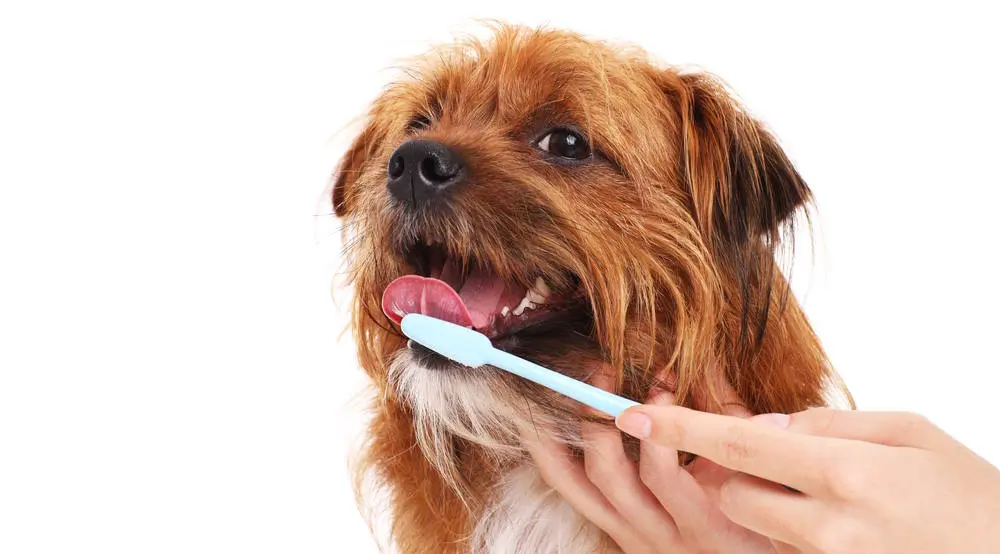
Before diving into dental care, it’s essential to understand the basics of what makes up a dog’s mouth. Understanding the structure of your dog’s mouth and being aware of the most common dog dental issues are crucial first steps towards effective dental care of our pups.
Dog Teeth Types and Functions
Dogs possess a diverse set of teeth, each serving distinct purposes vital for their health and survival:
- Incisors are the front teeth primarily used for nibbling and grooming, allowing dogs to pick and gently bite into objects.
- Canines are sharp, pointed teeth designed for holding and tearing food, essential for a dog’s predatory behavior.
- Premolars and Molars are located towards the back of the mouth, used for chewing and grinding food into smaller, digestible pieces.
The dog teeth are anchored by the Gums (Gingiva) that surround them and plays a critical role in dental health by providing the necessary support and nourishment. Taking care of the teeth means to also taking care of the Gums
Common Dog Dental Diseases
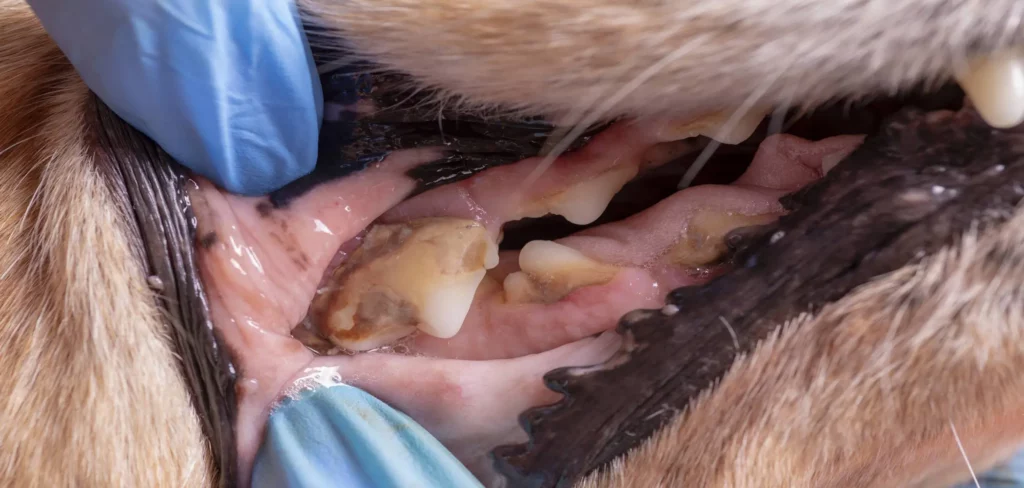
Dental diseases can significantly affect a dog’s quality of life. There are several types of dental problems that dogs can suffer, but let explore first the most common and most preventable, the periodontal diseases:
Periodontal Disease:
Affects a significant majority of canines over the age of three, and is a gradual disease that is categorized in stages
Stage 1: Gingivitis
It is the early stage of this disease is characterized by:
- Gum inflammation due to plaque and tartar.
- Red, swollen gums that may bleed easily are common signs.
This stage is reversible with proper dental care, including professional cleaning and regular brushing at home.
Stage 2: Early Periodontitis
After gingivitis progresses, the disease progresses to this stage characterized by:
- Minor loss of bone and attachment around the teeth.
- Slight bleeding of the gums on probing and more noticeable bad breath.
Early periodontitis can lead to systemic health issues if bacteria spread through the bloodstream
Stage 3: Moderate Periodontitis
In this stage the symptoms are more pronounced and include:
- Moderate loss of bone and attachment around the teeth,
- Gums are receding and there is possible exposure of root surfaces.
- Bad breath, bleeding on probing, and visible signs of dental distress.
The dog will have pain while eating
Stage 4: Advanced Periodontitis
If periodontitis is not properly treated will lead to stage 4:
- This final stage involves significant loss of bone and attachment,
- Teeth becoming loose and start falling out.
- Dogs may experience pain, severe bad breath, significant gum recession,
If teeth don’t fall will will have to be removed to reduced the bacterial infection.
Other Type of Oral Diseases
- Developmental and Congenital Disorders: Dogs may be born with or develop early in life.
- Endodontic Diseases: Affecting the tooth’s interior, such as pulpitis or tooth root abscesses.
- Tooth Decay and Abscesses: Cavities and abscesses due to bacterial infection.
- Oral Tumors: That potentially require surgical intervention.
For the Purpose of this Guide, we will focus on the Periodontal disease more that is the most common.
Genetics and Breed-Specific Dental Concerns
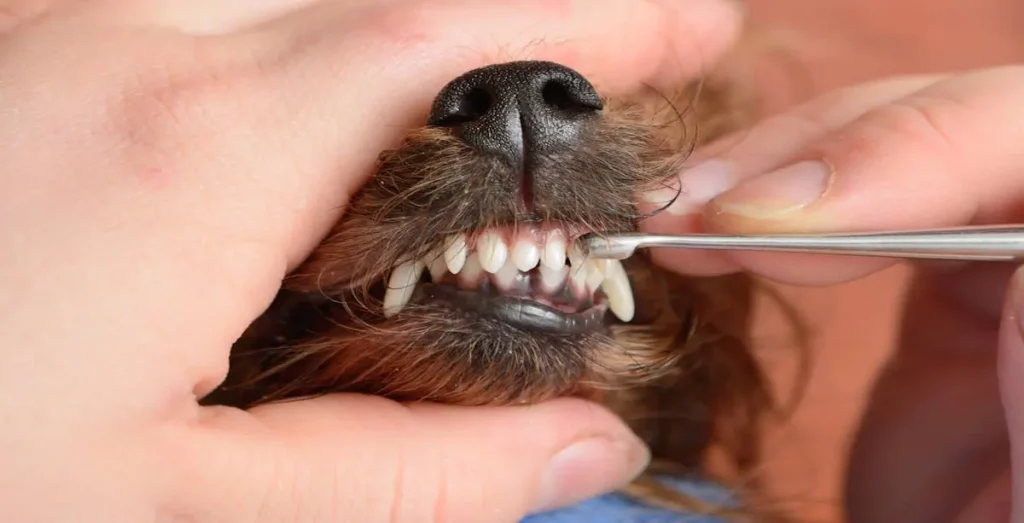
Understanding the intricate relationship between a dog’s breed and its dental health is crucial for devising a targeted dental care strategy. Different breeds come with unique sets of challenges that, if not addressed properly, can lead to significant dental health issues. Here’s why it matters:
Small Breeds (e.g., Chihuahuas, Dachshunds):
- Prone to overcrowding of teeth within a small jaw, leading to plaque accumulation and tartar build-up.
- Higher risk of periodontal diseases and tooth decay due to oral hygiene challenges.
This means that small breeds are at a higher risk for periodontal diseases and tooth decay. The compact oral space complicates oral hygiene efforts, necessitating more frequent dental check-ups and specialized cleaning techniques to prevent disease.
Large Breeds (e.g., German Shepherds, Labradors):
- Susceptible to dental wear from chewing and trauma, risking cracked or broken teeth and gum injuries.
- May need dental interventions for trauma-related issues.
For these dogs, it’s not just about regular brushing; it’s also about monitoring and protecting them from activities that could lead to oral injuries. Dental care for large breeds should include durable, safe chew toys and possibly preventive measures against trauma-related dental issues.
Brachycephalic Breeds (e.g., Bulldogs, Pugs):
- Short muzzles lead to unique challenges, such as teeth misalignment.
- Increased risk of periodontal disease due to complicated oral hygiene.
The unique anatomy of brachycephalic breeds means that standard dental care practices may not be sufficient. These dogs often require more sophisticated dental care approaches, including specialized tools and techniques to reach and clean all dental surfaces effectively.
Mixed Breed Considerations:
- Mixed breed dogs can inherit varied dental traits from their parentage, presenting unique dental health profiles.
- Their dental health may be less predictable, requiring a versatile approach to dental care and monitoring.
Breed Implications for Dental Care
Understanding these breed-specific predispositions enables more precise and effective dental health prevention, monitoring, and treatment strategies.
Regular tooth brushing and veterinary dental check-ups, tailored to each dog’s unique breed characteristics and health needs, are essential for maintaining optimal dental health across all breeds, including mixed breeds.
How to Recognize Signs of Dental Pain and Discomfort in Dogs
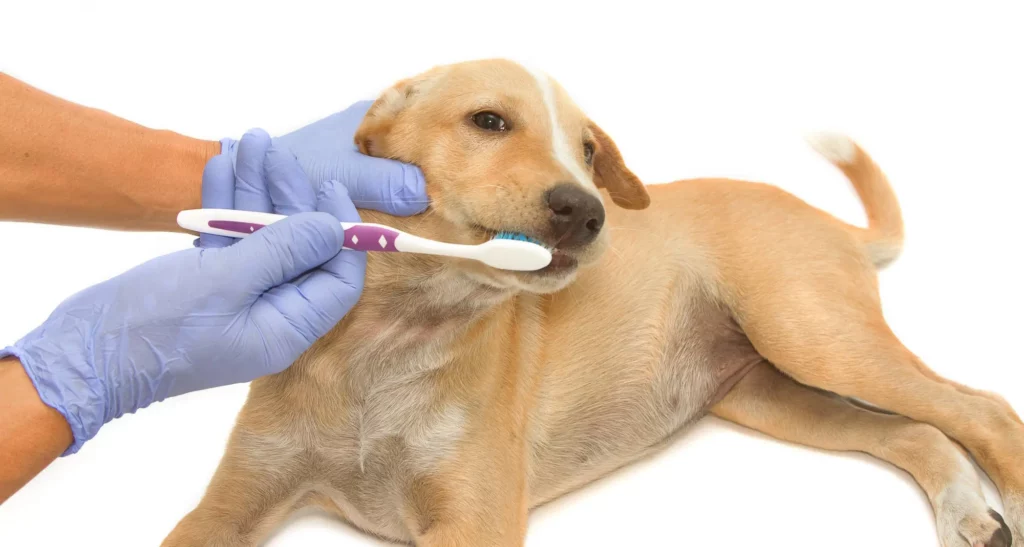
A crucial aspect of canine dental health is being able to identify when your dog is experiencing dental pain or discomfort. Dogs will exhibit various non-verbal cues that may indicate discomfort or distress. It’s important for us as caregivers to be attentive to these cues, as dogs’ responses to pain can vary widely.
Dog Behavior and Cues to Watch for
Here are some signs to watch out for:
Changes in Eating Habits:
- Why It Happens: Dental pain can make chewing painful, leading dogs to drop food, chew on one side of their mouth, or show a preference for softer foods.
- What to Do: Observe if these changes persist over meals and consider a veterinary examination to identify dental issues like tooth decay or gum disease.
Altered Behavior:
- Why It Happens: Pain can cause dogs to become irritable, less interactive, or even aggressive when they normally are not.
- What to Do: Note any changes in behavior, especially in conjunction with other signs of dental discomfort, and consult with a vet.
Pawing at the Mouth or Face:
- Why It Happens: This action indicates an attempt to relieve discomfort or irritation in the mouth.
- What to Do: Check for visible signs of injury or irritation. If the behavior continues, seek a professional evaluation.
Excessive Drooling:
- Why It Happens: Increased drooling, especially if blood-tinged, can indicate oral injuries, infections, or gum disease.
- What to Do: A vet check-up is warranted to rule out serious dental or gum issues.
Bad Breath:
- Why It Happens: Persistent bad breath is often a sign of bacterial infection or accumulation of plaque and tartar.
- What to Do: Implement a regular dental hygiene routine and schedule a dental exam to address potential periodontal disease.
Visible Signs on Gums and Teeth:
- Why It Happens: Red, swollen, or bleeding gums, along with tartar buildup, are common indicators of dental problems.
- What to Do: These are signs that should prompt immediate veterinary attention to prevent progression to more serious conditions.
Reluctance to Have Their Mouth Touched:
- Why It Happens: Discomfort or pain in the mouth makes dogs hesitant to have their heads or mouths touched.
- What to Do: Gradually accustom your dog to gentle mouth handling for easier examinations and dental care. If reluctance persists, consult a vet.
Recognizing these signs are essential for early intervention and treatment. Regular dental check-ups, both at home and professionally, can help catch these issues before they turn into significant problems.
Responding to Signs of Dental Pain and Discomfort
Upon noticing any of these signs, please communicate schedule a veterinary examination. If you have a grooming appointment ask the groomer to do a teeth examination and toothbrush if possible. Early detection and treatment can prevent the escalation of dental issues into more severe health problems. Regular home inspections of your dog’s mouth can help you stay familiar with their normal state, making it easier to spot when something is off.
The 5 Essentials of Dog Dental Care:
Ensuring your dog’s dental health is a crucial aspect of their overall wellbeing. A comprehensive approach involves more than just occasional teeth cleaning; it requires a consistent and holistic strategy that encompasses daily care, proper nutrition, and regular professional check-ups. Here’s an expert groomer’s guide to the essentials of dog dental care:
1. Regular Dental Practices at Home and During Grooming
Integrating regular dental care into both home routines and professional grooming sessions is essential for maintaining your dog’s oral health. This combined approach ensures thorough maintenance and early detection of potential issues, supporting a comprehensive dental care regimen.
Practices at Home:
- Brushing Frequency: Aim for brushing your dog’s teeth several times a week. Consistency is key, as is gradually acclimating your dog to the process to ensure it’s a positive experience.
- Regular Mouth Checks: Periodically inspect your dog’s teeth and gums for any signs of problems, such as redness or bad breath, and get your dog comfortable with having their mouth examined.
Practices during Grooming:
- Groomers can complement your home care routine by providing light teeth brushing services and alerting you to any dental health issues they might notice.
- Groomers insights can be invaluable, especially regarding brushing techniques and frequency recommendations tailored to your dog’s specific needs.
Please be aware that dogs should use their own toothbrush during grooming sessions to prevent the transmission of bacteria between dogs.
Conclusion:
A balanced routine that includes regular brushing at home, along with professional grooming support, forms the foundation of effective dental care. This approach not only helps in maintaining dental hygiene but also in fostering a routine that accommodates your and your dog’s lifestyle, ensuring your pet’s teeth remain healthy and clean.
2. Choosing the Right Dental Care Products
Selecting the appropriate dental care products is crucial in maintaining your dog’s oral health. With a variety of options available, it’s important to understand what products best suit your dog’s specific needs and how to use them effectively. Here are key considerations to guide you in making informed choices:
Dog Toothbrushes and Toothpaste:
- Toothbrush Selection: Choose a toothbrush that’s the right size and shape for your dog’s mouth. There are brushes specifically designed for dogs, including angled brushes to reach back teeth and finger brushes for more controlled brushing.
- Toothpaste for Dogs: Always use toothpaste formulated for dogs. Human toothpaste can be harmful to your pet. Dog-specific toothpaste comes in flavors appealing to dogs, such as chicken or beef, making the brushing experience more enjoyable for them.
Dental Chews and Toys:
- Dental Chews: Look for dental chews that are proven to reduce plaque and tartar buildup. Ensure they are the right size for your dog to avoid choking hazards. Some dental chews have been awarded the Veterinary Oral Health Council (VOHC) seal of approval, indicating they meet certain standards for plaque and tartar control.
- Chew Toys: Durable chew toys can also help clean teeth through the natural action of chewing. Choose toys that are safe for your dog’s size and chew strength to prevent broken teeth or other injuries.
Water Additives and Dental Wipes:
- Water Additives: These can be added to your dog’s drinking water to help reduce plaque and freshen breath. They should be used as a complement to brushing, not as a replacement.
- Dental Wipes: Dental wipes are a good alternative for dogs that resist brushing. They can be used to wipe the outer surfaces of the teeth, helping to remove plaque.
Innovative Products:
- Stay informed about new dental care innovations. Products such as oral gels and dental sprays offer additional options for keeping your dog’s teeth clean, especially for those that do not tolerate brushing well.
Consulting with Your Veterinarian:
- Before introducing any new dental care product, it’s wise to consult with your veterinarian. They can recommend products that are appropriate for your dog’s age, size, and specific health needs, ensuring that your choice contributes positively to their overall dental care routine.
Conclusion:
Choosing the right dental care products is a vital step in your dog’s oral hygiene routine. By selecting products that cater to your dog’s preferences and needs, you can make dental care a positive experience for both of you, ensuring your dog’s mouth stays healthy and clean. Remember, consistent use and regular dental check-ups complement these efforts, keeping your dog’s smile bright and healthy.
3. Nutrition and Its Impact on Dental Health
The connection between what your dog eats and their dental health is significant. Proper nutrition plays a key role in maintaining healthy teeth and gums, which, in turn, supports overall health. Understanding how diet affects oral health can help you make better food choices for your furry friend.
Quality Diet:
- A balanced, nutrient-rich diet is essential for strong teeth and healthy gums. Look for dog foods that meet the nutritional standards established by the AAFCO (Association of American Feed Control Officials). These foods contain the right balance of calcium, phosphorus, and other vital nutrients that support dental health.
Dry Food vs. Wet Food:
- Dry Food (Kibble): Feeding dry kibble can help mechanically clean the surface of teeth, reducing plaque buildup. The abrasive action of chewing hard kibble helps to scrape away tartar and can stimulate gum health.
- Wet Food: While wet food is beneficial for hydration and may be necessary for dogs with certain health conditions, it tends to stick to the teeth more than dry food, which can lead to plaque buildup. If your dog’s diet consists primarily of wet food, incorporating dental care practices becomes even more important.
Chewable Foods and Treats:
- Certain types of chewable dog treats and foods are designed to promote dental health. These products can help reduce plaque and tartar build-up through the natural action of chewing. However, it’s important to select treats wisely, as some can be high in calories or might not be suitable for all dogs.
Avoid Sugary Treats:
- Just like in humans, sugary foods can lead to tooth decay in dogs. Avoid giving your dog treats that are high in sugar. Opt instead for healthy, dental-friendly snacks that satisfy their chewing instinct and contribute to oral hygiene.
Dental Health Supplements:
- Some dietary supplements are formulated to support dental health, offering ingredients that can help reduce plaque and tartar or improve breath. Always consult with your veterinarian before adding any supplements to your dog’s diet to ensure they’re necessary and appropriate.
Hydration:
- Adequate water intake is crucial for maintaining oral health. Water helps to wash away food particles and can dilute the concentration of bacteria in the mouth, reducing the risk of plaque formation.
Consultation with a Veterinarian:
- Discuss your dog’s dietary needs with your veterinarian, especially if you have concerns about their dental health. They can recommend specific types of food, supplements, or treats that can support oral health based on your dog’s individual requirements.
Conclusion:
Nutrition plays a foundational role in the health of your dog’s teeth and gums. By choosing the right foods, being mindful of treat selection, and possibly incorporating dental health supplements, you can significantly impact your dog’s oral hygiene positively. Remember, a healthy diet complements regular dental care routines, forming a comprehensive approach to maintaining your dog’s overall health and well-being.
4. Professional Dental Cleanings and Check-Ups
Regular professional dental cleanings and check-ups are indispensable components of your dog’s overall health regimen. These appointments go beyond what can be achieved with at-home care, providing a deep clean and thorough examination that can prevent dental diseases and detect issues before they become serious.
Why Professional Cleanings are Essential:
- Deep Cleaning: Professional cleanings involve scaling to remove plaque and tartar from above and below the gum line, followed by polishing. This process can prevent periodontal disease, tooth decay, and can lead to the early detection of potential problems.
- Anesthesia: To ensure a thorough cleaning and a safe experience for both the dog and the veterinary staff, these procedures are typically performed under anesthesia. This allows the veterinarian to examine and clean every tooth thoroughly without causing stress or discomfort to your dog.
The Role of Regular Check-Ups:
- Early Detection: Regular check-ups allow veterinarians to catch early signs of dental issues, such as gingivitis, broken teeth, or growths in the mouth. Early intervention can prevent these issues from developing into more serious conditions that might require extensive treatment.
- Tailored Dental Care Advice: During a check-up, your vet can provide personalized advice on your dog’s dental care routine, recommend specific products, and suggest dietary changes if necessary to support dental health.
Frequency of Visits:
- The recommended frequency of professional dental cleanings and check-ups can vary depending on your dog’s age, breed, and overall dental health. However, an annual visit is a good rule of thumb for most dogs. Some dogs, especially those with a history of dental issues or certain breeds prone to dental problems, may require more frequent visits.
Preparing for a Cleaning:
- Pre-Anesthetic Exam: Before a cleaning, your veterinarian will likely recommend a pre-anesthetic exam and possibly blood tests to ensure your dog is healthy enough for anesthesia.
- Post-Care: Your vet will provide instructions for care after the cleaning, which may include soft foods and monitoring for any signs of complications.
The Importance of a Trusted Veterinarian:
- Establishing a relationship with a veterinarian you trust is crucial. A good vet will not only perform cleanings and check-ups but also be your partner in managing your dog’s dental and overall health.
Conclusion:
Professional dental cleanings and check-ups play a critical role in maintaining your dog’s dental health. They complement your at-home dental care routine, ensuring that your pet receives a comprehensive approach to oral hygiene. By prioritizing these visits, you’re investing in your dog’s health, comfort, and quality of life, preventing dental diseases before they start and keeping those tails wagging happily for years to come.
5. The Integration of Dog Dental Health into Overall Wellness Routines
Integrating dental health into your dog’s overall wellness routine is crucial for their long-term health and well-being. This holistic approach ensures that dental care is not viewed in isolation but as a part of a comprehensive health strategy.
Routine Health Checks:
- Include oral health evaluations as part of your regular veterinary check-ups. This ensures any dental issues are identified and addressed alongside other health concerns.
Lifestyle Factors:
- Consider how lifestyle factors, such as diet, exercise, and play, contribute to dental health. For instance, certain types of chew toys and treats not only provide entertainment and physical activity but also support dental hygiene.
Early Intervention and Prevention:
- Emphasize preventative measures, including the use of dental care products and regular cleanings, to avoid the development of dental diseases that can impact overall health.
Education and Awareness:
- Stay informed about the signs of dental health issues and the latest in dental care practices. Knowledge empowers you to make the best decisions for your dog’s health.
Collaboration with Professionals:
- Work closely with your veterinarian and, if applicable, your professional groomer, to create a tailored wellness routine that includes dental care. Their expertise can guide you in adopting the most effective practices.
Conclusion:
By viewing dental health as an integral part of your dog’s overall wellness routine, you can ensure a more holistic approach to their care. This perspective helps in recognizing the interconnections between oral health and general health, promoting a happier, healthier life for your dog.
Maintaining your dog’s dental health is key to their overall wellbeing, intertwining daily routines, the right products, a nutritious diet, and regular vet visits into a cohesive care plan. This holistic approach ensures that every aspect of your dog’s dental needs is met, from home care to professional cleanings.
Tailored Dental Care for Puppies and Senior Dogs
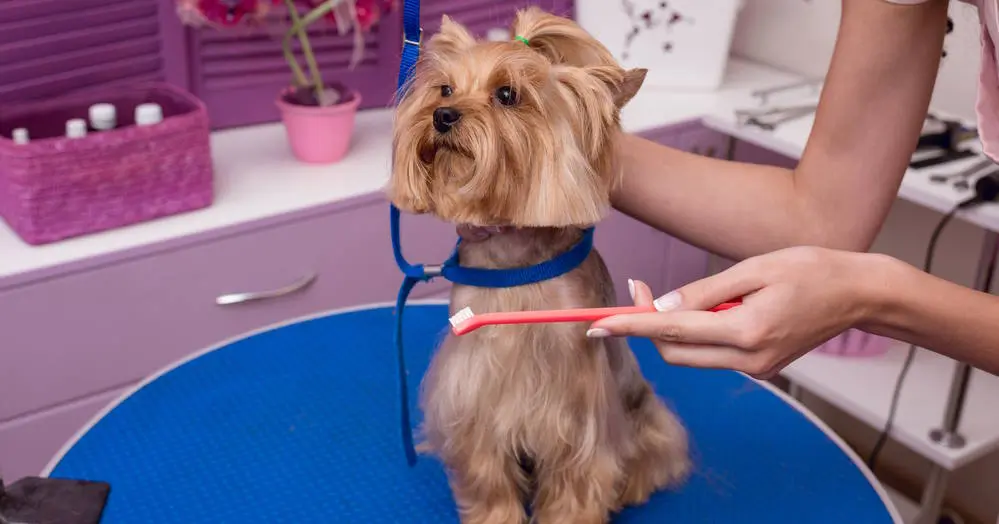
Dental care needs evolve as dogs progress from puppyhood to their senior years. Tailoring dental care practices for puppies and senior dogs ensures they receive the appropriate care suited to their life stage, promoting lifelong oral health.
Puppies:
Puppies require a gentle introduction to dental care that sets a foundation for healthy habits. Their dental care routine should include:
- Early Introduction: Begin dental care routines early by gently massaging your puppy’s gums and asking for tooth brushing their teeth in the grooming visits. This helps acclimate them to regular dental care.
- Teething Support: Provide safe, appropriate chew toys to help alleviate discomfort associated with teething and to encourage healthy chewing habits.
- Regular Veterinary Checks: Schedule regular dental check-ups as part of your puppy’s health visits. These can help identify any developmental dental issues early, such as misaligned teeth, ensuring prompt intervention.
Senior Dogs:
Senior dogs face their own set of dental challenges, including increased risk of periodontal disease, tooth loss, and other oral health issues. Their dental care should focus on:
- Gentle Cleaning: Use soft-bristled toothbrushes and specially formulated toothpaste for sensitive teeth. Senior dogs may have more sensitive mouths, making gentle brushing essential.
- Regular Dental Assessments: Increased veterinary check-ups are vital for early detection of oral health issues common in older dogs. These visits can also help manage any existing conditions with appropriate treatments. Once a year is a rule of thumb but should be more frequent if the dog has dental problems.
- Dietary Adjustments: Consider incorporating softer foods or special senior diets that are easier to chew and digest, especially for dogs with missing teeth or gum disease.
For Both Life Stages:
- Professional Cleanings: Regardless of age, professional cleanings as recommended by your veterinarian play a critical role in maintaining dental health.
- Monitoring: Keep a close eye on your dog’s dental health, watching for signs of dental disease or discomfort, and consult your veterinarian if you have any concerns.
Conclusion:
Tailored dental care for puppies and senior dogs addresses the unique challenges and needs at each life stage. By adopting a proactive and age-appropriate approach to dental hygiene, you can help ensure your dog maintains a healthy mouth throughout their entire life. Regular veterinary care, combined with suitable at-home dental practices, forms the cornerstone of effective dental health management for dogs of all ages.
Conclusion: Embracing Holistic Dental Care with Hachi Dog Grooming
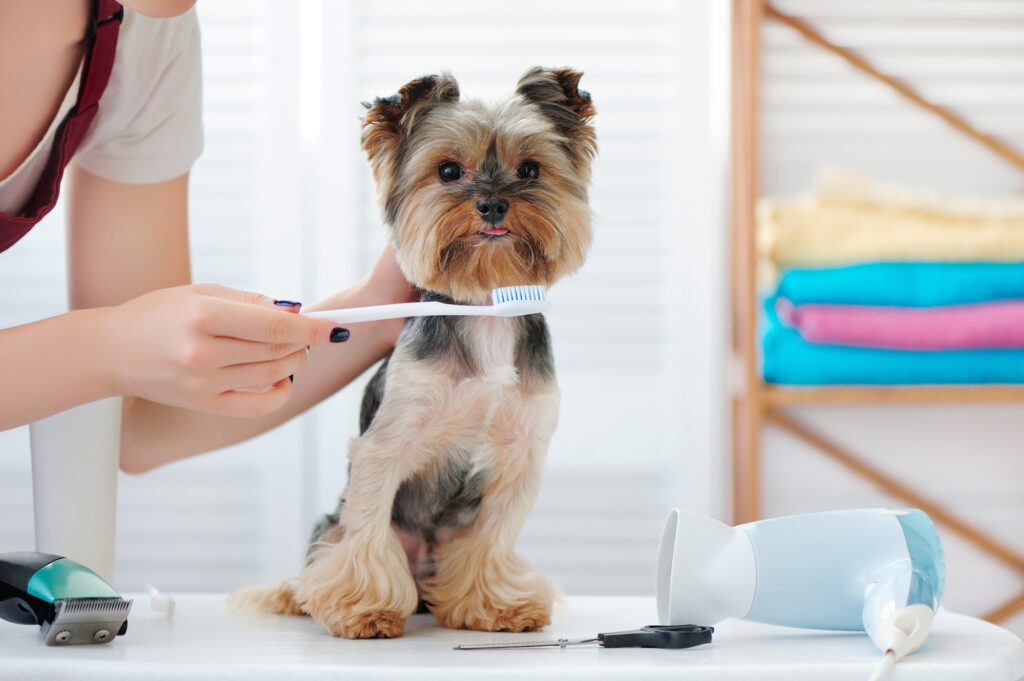
As we conclude our guide on canine dental health, we emphasize the deep link between dental well-being and your pet’s overall health. Hachi Dog Grooming believes that true health starts with a healthy mouth, paving the way for a joyful and vibrant life for your dog.
- Key Insights Covered:
- We’ve navigated through dog dental anatomy, common dental diseases, and the value of professional care.
- Offered tips for home tooth brushing and selecting the best dental products.
- Highlighted how diet influences dental health and tailored care for puppies and seniors.
- Our Commitment:
- Beyond grooming, we ensure each dog receives a personal toothbrush for hygiene and safety.
- Our selection of tasty toothpastes makes dental care enjoyable, turning it into a fun part of their daily routine.
We’re grateful for your trust in us to care for your dog’s dental health. Together, we’ll continue to work towards a lifetime of happiness and health for your loyal companion. At Hachi Dog Grooming, we’re not just caring for their appearance; we’re dedicated to enhancing their overall wellbeing, one smile at a time.
FAQs About Dog Dental Care at Hachi Dog Grooming
1. How often should my dog receive professional dental cleanings?
- Professional dental cleanings are advised annually, starting from the age of two or three. The exact frequency depends on your dog’s breed, overall dental condition, and individual health requirements.
2. Can human toothpaste be used for dogs?
- Never use human toothpaste for dogs; it can be toxic to them. Hachi Dog Grooming offers dog-specific, flavored toothpaste to ensure safety and enjoyment for your pet.
3. What signs indicate my dog might have dental issues?
- Look out for bad breath, reluctance to eat, pawing at the mouth, increased drooling, and visible tartar. Observing any of these signs warrants a consultation with us or your vet.
4. Do dental chews really help with dental health?
- Yes, dental chews are a useful addition to dental care routines. They aid in minimizing plaque and tartar but should complement, not replace, daily tooth brushing.
5. Should I brush my puppy’s teeth, and when do I start?
- Absolutely, initiating dental care early is crucial. Begin brushing your puppy’s teeth upon their arrival home to acclimate them to the routine, promoting lifelong dental health.
At Hachi Dog Grooming, we’re dedicated to ensuring your pet’s dental care is managed with expertise and compassion, contributing to their overall well-being and happiness.
Meet one of our happy clients at Hachi Dog Grooming! Regular grooming ensures your pet’s fur stays healthy, shiny, and free from troublesome mats.
Visit us in our Dog Salon in Kendall for expert care
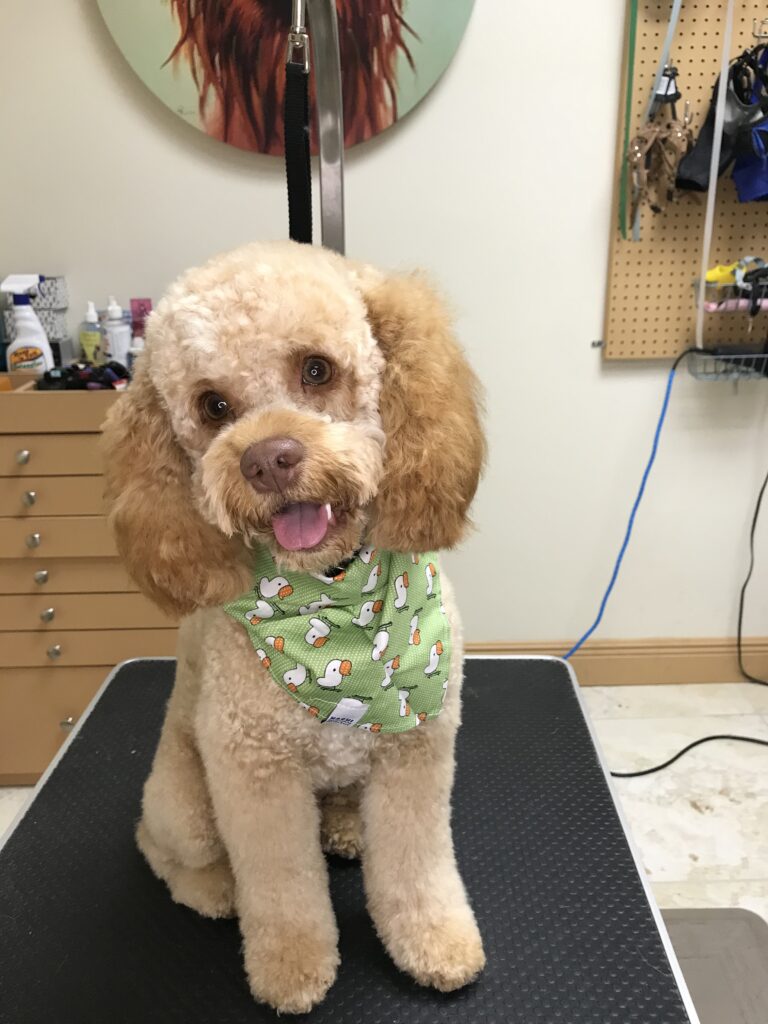
Visit Hachi Dog Grooming in Kendall for Expert Services
For Kendall residents looking for top-notch pet grooming services to prevent or treat dog matting, we invite you to visit our Dog Grooming Salon in Kendall. Our skilled professionals are dedicated to ensuring your dog’s coat is healthy, mat-free, and looking its best. Contact us to learn more about our dog grooming services and how we can help your beloved pet.
Additional References about Dog Dental Care
- American Veterinary Medical Association (AVMA): A comprehensive guide on pet dental health, offering insights and tips on maintaining your dog’s dental health.
- PetMD: An informative article on the importance of dental care for pets, including common dental issues in dogs and prevention tips.
- VCA Animal Hospitals: Detailed information on professional dental cleanings for dogs, what to expect, and why they are necessary.
- WikiHow Pet: A step-by-step guide on how to brush your dog’s teeth, making dental care an easy and effective routine.
- American Animal Hospital Association (AAHA): Guidelines and recommendations on dog dental care and the importance of regular dental check-ups.
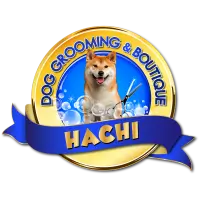
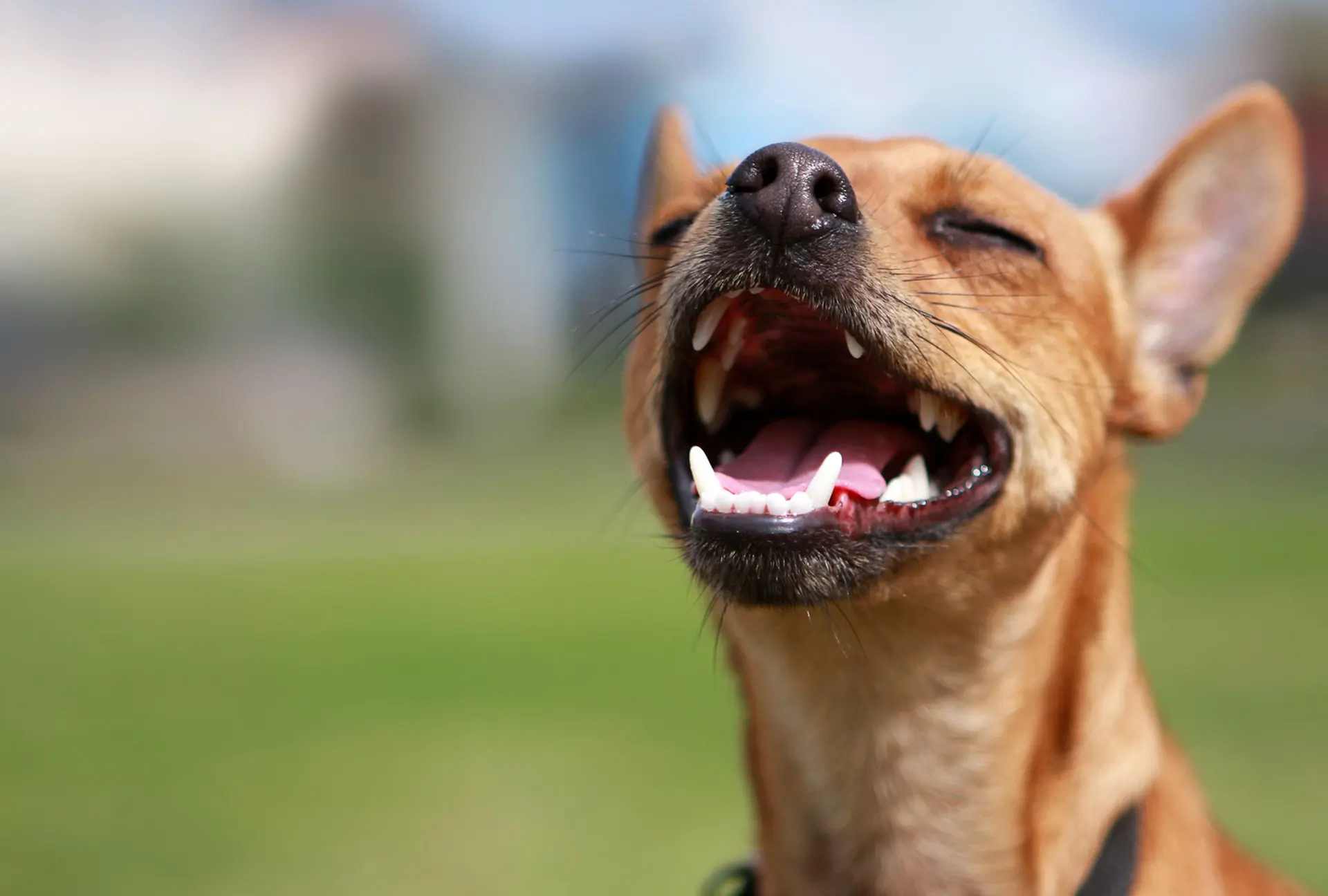
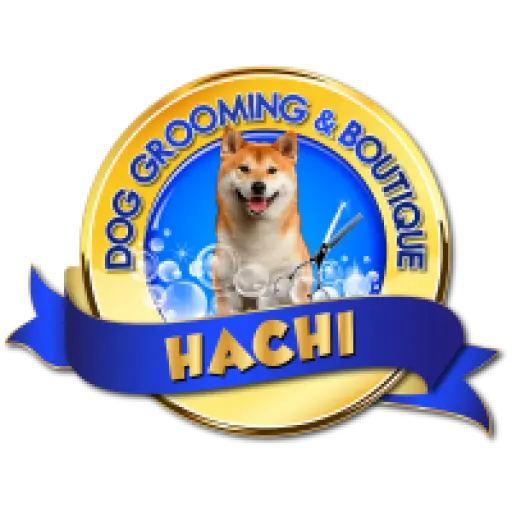
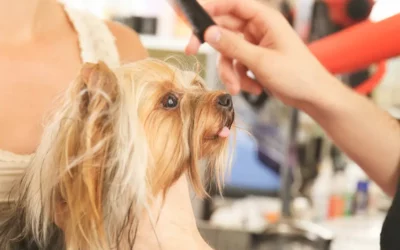
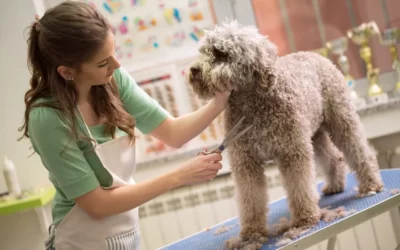
0 Comments